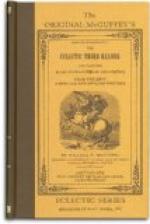[Humorous Advertising]
In these books the publishers found space for a little advertising of their wares. In Pickett’s Readers there is printed conspicuously at the top of a page a warm commendation of Pickett’s Readers, written in 1835 by William H. McGuffey, Professor at Miami University, in which he “considers them superior to any other works I have seen.” That was before he made his own readers. Mr. Smith responded by publishing a strong commendation of one of his books signed by Mr. Albert Pickett. Life is seldom devoid of the lesser amenities.
The Willson Readers, published by the Harper Brothers, were vigorously pushed into the schools of Ohio and Indiana about 1867. The first supply was usually sold to the school authorities by agents who operated on the commission plan. Thus the agents had an interest in the introduction sales, but cared nothing about the continuance of sales in after years. Booksellers, meanwhile, kept the McGuffey Readers in stock, and whenever new readers were desired these were easily obtained. In a few years the Willson Readers were out of the schools. Of course, there was no lack of traveling agents and of circulars which freely criticised these Willson Readers, which were constructed to teach not only reading but science. After a short time the children wearied of reading about bugs and beetles they had never seen and gladly welcomed the books that had a single aim.
[Enduring Qualities]
In the eyes of a publisher a good schoolbook is one that can be readily introduced and one that will stay when it is put in use. The officials who adopt a schoolbook are not the users of the book. They are adults long past the school age. Cases have been known when in important adoptions the majority of the adopting board had not seen the inside of a school room for twenty-five years. Of course such men are far behind the schools. They are governed by their own past experience. When the teachers are allowed to have a voice in the way of advice, the real needs of the pupils obtain more consideration. But the final real judge of the merits of a schoolbook is the boy or girl who uses it. If the book is truly pedagogical, adjusted in every part to the average mental development of the child, it becomes a valuable tool in the school room. If on the other hand it is a mere collection of novelties such as catch the eye of inexpert judges and impress merely the imagination, the books may be introduced; but they won’t stay.
[Child Nature]
The McGuffey Readers had staying qualities. Teachers often became so familiar with their contents that they needed no book in their hands to correct the work, but to each child the contents of the book were new and fresh. It is the fashion of the present day to exalt the new at the expense of the old. But the child of today is very much such as Socrates and Plato studied in Greece. The development of the human mind may be more generally understood than




